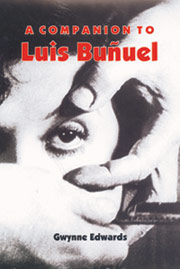(Tamesis Books, 186 pages, $37.95)
By Gwynne Edwards
 Luis Buñuel, like many great international filmmakers, still dwells, to a considerable extent, on the far side of a linguistic and cultural barrier. What we have until now lacked, however, is a study that relies primarily on Spanish-language sources, extensively researched and translated by the author. Gwynne Edwards takes us beyond what has previously been available to tap fascinating untranslated memoirs by Buñuel's wife and devoted younger sister Conchita. Edwards introduces us to the classics of Spanish literature, beyond Cervantes, which undoubtedly influenced Buñuel, and explains the director's debt to Goya, particularly Los Caprichos, a series of coruscating satires by that most Spanish of painters.
Luis Buñuel, like many great international filmmakers, still dwells, to a considerable extent, on the far side of a linguistic and cultural barrier. What we have until now lacked, however, is a study that relies primarily on Spanish-language sources, extensively researched and translated by the author. Gwynne Edwards takes us beyond what has previously been available to tap fascinating untranslated memoirs by Buñuel's wife and devoted younger sister Conchita. Edwards introduces us to the classics of Spanish literature, beyond Cervantes, which undoubtedly influenced Buñuel, and explains the director's debt to Goya, particularly Los Caprichos, a series of coruscating satires by that most Spanish of painters.
Edwards structures the study around Buñuel's principal friends and enemies: the surrealists (friends at first, then not), the Catholic Church (enemies forever), and the bourgeoisie. The second chapter—"A Surrealist in Chains"—considers Buñuel's own complicated internal battles as a bourgeois educated by Jesuits who aspired to the total destruction of everything that had formed him. Buñuel was, as he forgivingly said of his fellow surrealists, "a bourgeois revolting against the bourgeoisie." Edwards writes revealingly of exactly how wealthy the Buñuel family was—"the third or fourth richest family in Zaragoza"—and cites the director's memory of a strict and not quite absolutist father who "did absolutely nothing." In contrast, his sister Conchita recalls how Luis "lived like an anchorite" all his life, eating and dressing simply, and sleeping on bare boards with the windows open. From the memoir of Buñuel's widow Jeanne we learn that her husband, who so aggressively portrayed sexual deviation on screen in films like Viridiana (1961), Belle de Jour (1967), and That Obscure Object of Desire (1977), was himself rather sexually repressed—a macho, volcanically jealous old-school Spaniard (albeit a loyal, unstraying husband). And despite the liberationist tendencies of the surrealism he embraced, and for all of his proclaimed atheism, Buñuel never entirely unshackled himself from the Church (in later life his friends included many priests), making his famous proclamation, "still an atheist—thank God!" seem much more complicated and ambiguous.
In 186 brisk, succinct pages, Edwards has managed to add several new dimensions to our understanding of Buñuel's work, without any recourse to academese or rank speculation. One wishes other directors of similar vintage and foreign provenance could be reintroduced to us this capably.